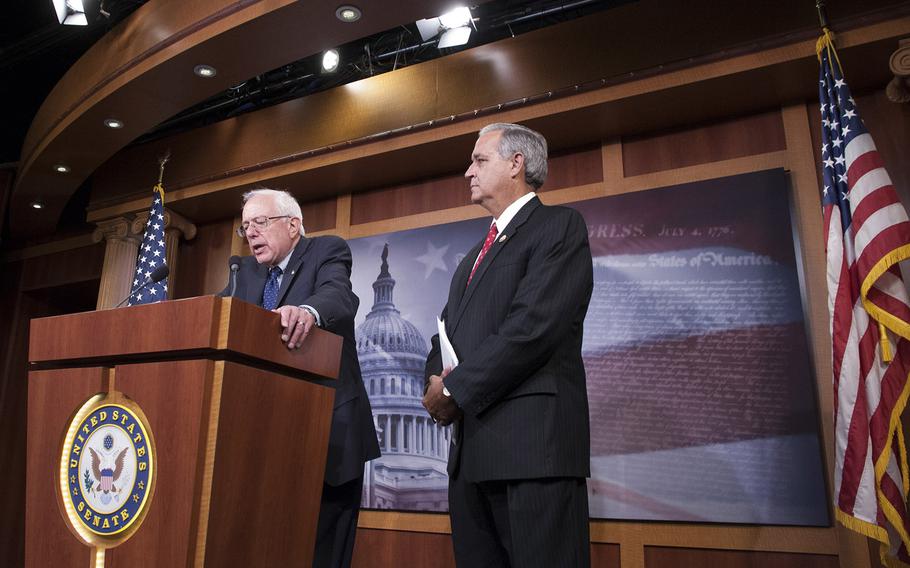
Sen. Bernie Sanders, I-Vt., left, and Rep. Jeff Miller, R-Fla,, talk about the VA reform bill Monday at the Capitol. (Joe Gromelski/Stars and Stripes)
WASHINGTON — Capitol Hill lawmakers signed off Monday night on a detailed $17 billion compromise to overhaul the troubled Department of Veterans Affairs.
The plan cracks down on employee wrongdoing but also directs billions into growing and studying the department after a nationwide scandal over long wait times and falsified records.
A conference committee of House and Senate leaders on veteran issues agreed to the deal, but its future is far from certain. The far-reaching legislation must pass both chambers, and lawmakers were working against the clock Tuesday to orchestrate floor votes before a month-long recess that begins Friday.
So what exactly is in the reform bill?
Outside care: The vast majority of new spending would go into expanding access to private care for veterans who are having difficulty getting VA treatment.
A $10 billion Veterans Choice Fund would be created in the U.S. Treasury. The money could be tapped to fund private treatment when beneficiaries cannot get an VA health care appointment within two weeks or live more than 40 miles from a VA facility. A pilot program providing access to outside care in five of the 23 VA service networks would be extended for two years.Staff and medical facilities: The compromise puts $7 billion into hiring and leasing to expand capacity in the VA system.
$5 billion would go toward new primary care and specialty care physicians as well as other doctors, nurses, social workers and mental health professionals. $2 billion would be used to lease new major medical facilities in New Mexico, New Jersey, South Carolina, Georgia, Hawaii, Kansas, Louisiana, California, Puerto Rico, Connecticut, Massachusetts, Missouri, Illinois, Nebraska, Arizona and Oklahoma. Each year, VA would report the five job positions with the largest staffing shortages and work to fill them. Graduate medical education residency positions at medical facilities would increase by up to 1,500. A medical scholarship program requiring service in the department would be extended for five years, and limits on a federal debt reduction program for graduates who go to work for the VA would be increased. Mobile VA medical centers that provide vets tele-medicine would be standardized with set goals and schedules to improve access.Staff wrongdoing: Lawmakers in both chambers supported measures cracking down on staff behind falsified data on patient wait times.
Senior executives could be fired at will by the secretary and would have only seven days to appeal. The Merit Systems Protection Board would then refer the case to an administrative judge who would be required to make a decision on the appeal within three weeks. If no decision is reached, the secretary’s decision stands. Any VA employee who falsifies medical appointment scheduling data or directs others to falsify data faces civil penalties, unpaid suspensions or termination. In-person training on how to schedule veterans for appointments would be required for employees at medical facilities. Patient wait times could no longer be factors in employee awards and bonuses, though the VA abandoned the practice earlier this year.Identifying problems: The VA is the largest integrated health care system in the United States, and many have struggled to understand the scope and nature of its dysfunction. The compromise calls for new looks at how the department functions.
The VA would contract for a private independent assessment of its health care system and management, which would focus on the needs of veterans and workloads of its staff. A commission would examine how best to organize the VA health care system, locate health care resources and deliver health care to veterans over the next two decades. A technology task force would review the VA’s computerized scheduling system and its software. The VA must implement any recommended upgrades within a year.Sex assault: The military has struggled with how to handle and treat sexual assault. Lawmakers want to more VA assistance in overcoming has been called an epidemic.
VA counseling would be expanded to include active-duty and reserve troops A report would be done comparing the treatment and services available to male veterans who experienced sexual trauma in the military with those available to female veterans.Cuts: The compromise this week would mean a big increase in emergency spending that would normally require cuts elsewhere. To placate budget hawks, lawmakers said the compromise includes $5 billion in “offsets” – spending cuts from the VA budget.
VA would be barred from handing out more than $360 million in employee awards or bonuses in any given fiscal year. Veterans would be denied money under the Montgomery GI Bill All-Volunteer Force Educational Assistance Program and Post-9/11 Educational Assistance programs if they are being charged higher tuition than in-state students pay. A cap on VA pensions for veterans who get Medicaid coverage for nursing facilities would be extended for a decade. Collection of fees on Veterans Housing Benefit Program Fund loans would be extended for a decade.tritten.travis@stripes.com Twitter: @Travis_Tritten